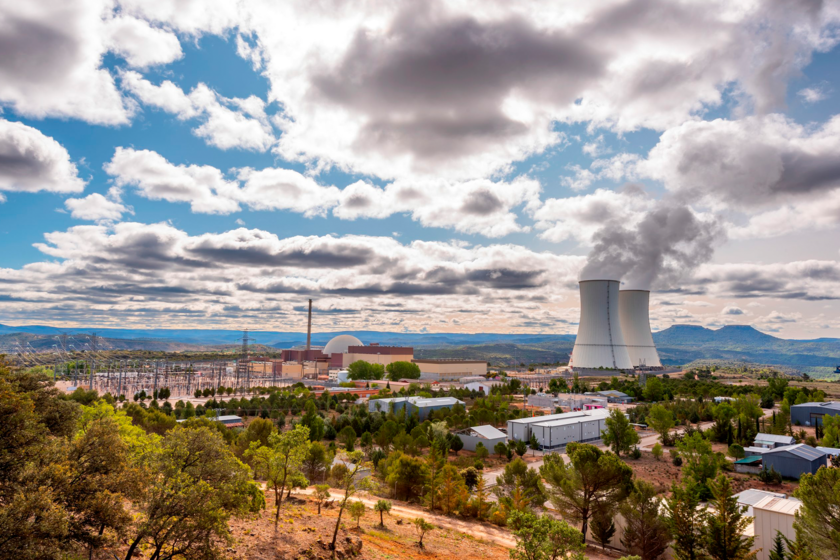The debate on a possible extension of nuclear plants has returned to the scene and has turned on the media focus. The electricity insists on lengthening their operation beyond the expected, but the executive denies that formal negotiations are being maintained and refers to the conditions that already set as essential.
A letter and three conditions. Iberdrola and Endesa sent a joint letter to the government will make more or less a month. In it, they proposed to reopen the debate on the progressive closure of the nuclear park – which contemplates the off the seven reactors between 2027 and 2035 – with the argument that maintaining operational some centrals would reduce the cost of electricity for consumers.
According to El País, the Government responded by another letter signed by the Ecological Transition Minister, Sara Aagesen, opening to assess the proposal under three immovable conditions: that there is no additional cost for citizens, that the security of the supply is guaranteed and that the plants comply with the standards of the Nuclear Security Council.
So far they “dialogue.” According to eldiario.es, the government considers the letter of electricity as a declaration of intentions, not a formal request. In addition, Naturgy and EDP – also minority owners of some plants – did not sign the document, which leaves Iberdrola and Endesa alone.
The debate intensifies. The situation is complex for a primary reason that is not technical, but the economic viability of nuclear. As the confidential explained, the electric ones consider that operating with the current fiscal load is unfeasible if the market Price does not exceed € 65-70/MWh. In contrast, projected prices are around € 55/MWh by 2030.
In this context, the Endesa CEO, José Bogas, raises the government a fiscal reduction, especially autonomic taxes (such as the one already eliminated in the Valencian Community) and the Enresa rate, which finances the dismantling of the centrals and waste management. However, according to the miteco, this fiscal reduction would involve damage to citizens, and therefore clashes frontally with their red lines.
Almaraz, the first thermometer. The immediate focus is at the Almaraz nuclear power plant (Cáceres), whose first reactor must close in November 2027 and the second in October 2028. Iberdrola, Endesa and Naturgy – his three owners – have not yet met to approve the necessary investments that would allow their operation beyond those dates. The meeting scheduled for June has not been held, and sector sources admit that it will not occur before September.
Meanwhile, companies prepare a new proposal that, according to the confidential, could be presented after summer at a meeting not yet confirmed with Minister Aagesen. The plan would be to offer a tax reduction in exchange for prolonging the activity of some centrals until 2030. However, the Ministry insists: if the conditions do not change, there will be no negotiation.
A hot topic in Congress. The debate is more than served from the political field. On the one hand, the Popular Party preparing a Proposition of law to extend the life of nuclear. The proposal would have the support of several regional governments of the PP – as Extremadura and Community Valencian – and the parliamentary support of Junts and ERC, which have shown flexibility in Congress in relation to the revision of the nuclear calendar.
However, the government has reaffirmed its position. As El Confidencial recalled, President Pedro Sánchez was bluntly in Congress last May, accusing PP and Vox of acting as “amateur lobists” of electricity. “If companies want to keep the centrals open, they pay them, not the citizens,” he settled.
Facing an ambivalent European framework. In addition, the legal position of nuclear energy in the EU adds complexity, since European regulations do not consider nuclear energy as a renewable source. This is established by Directive 2018/2001 (Red II), a vision that has also adopted Spanish legislation. However, in 2022, the European Commission took a partial turn by including this technology, under certain conditions, in the so -called “green taxonomy”, together with natural gas. This classification allows certain nuclear investments to be labeled as sustainable from the climate point of view.
As Miguel Huarte has expanded, this places the nuclear in a normative gray area: it is not renewable, but emission free in its operation. And while France or Belgium have already chosen to extend their atomic parks, Spain maintains the opposite course.
Accelerating another route. At the same time, the miteco has processed this July 31 a new Royal Decree by urgent route to reinforce the electrical system. As indicated in a press release, it is a technical standard that does not directly add the nuclear calendar, but it points to a reinforcement of the electrical system by means of supervision, electrification of the demand and promotion of energy storage.
Among other measures, the proposal increases the technical control of Electricity and CNMC, promotes renewable hybridization with storage systems and limits speculation on connection points. Although the text does not mention the nuclear, it reinforces the idea that the government bet remains clear: moving towards a 100% renewable mix.
A door ajar. The crossing of cards between electric and government has served more to draw red lines than to open doors. What is played, beyond the kilowatt, is the country’s energy model: one where renewables are implacable and nuclear tries to scratch time under the promise of stability.
But as the newspaper has pointed out, without a formal proposal and without an explicit resignation to tax privileges, electricity will continue to wait at the gates of a ministry that, for now, remains firm: either they meet the conditions, or the closing calendar will continue its course. The future of Almaraz – and perhaps that of the entire nuclear park – will be decided, if, after summer. And with many more letters even to play.
Image | Foronuclear
WorldOfSoftware | Spain was supposed to have a “antiapagones” plan. It has encountered an insurmountable obstacle: politics











